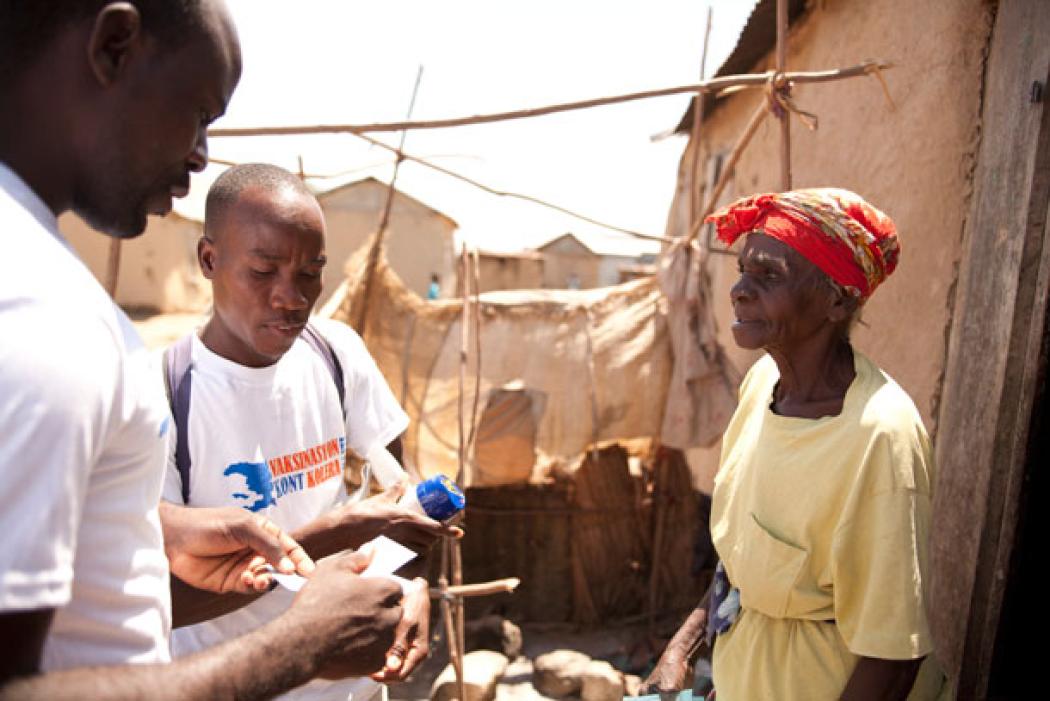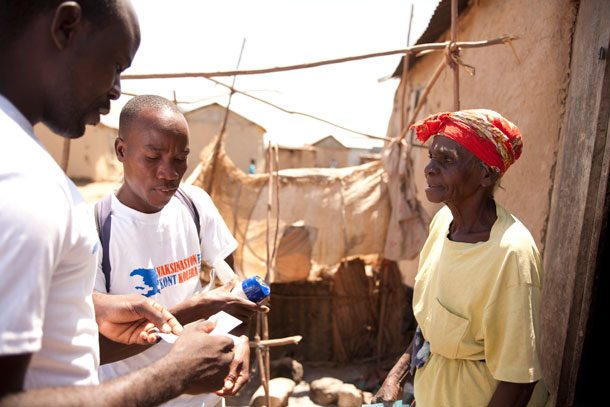Honoring frontline health workers on the anniversary of Haiti’s earthquake

By Kate Greene, Partners In Health Three years ago, a devastating earthquake rocked Port-au-Prince and its environs, killing more than 250,000 people and leaving 1.5 million homeless. Many of us remember the intensive news coverage showing frontline health workers, both Haitian and those from around the world, rushing to the scene to care for the survivors. As we commemorate this tragic day with most of the reporters and humanitarian groups gone, it is important to recognize the work of Haitian frontline health workers who responded heroically to the disaster. These health workers also quietly sustained the country’s fragile health system before the earthquake and now continue to work tirelessly to address communities’ needs. Frontline health workers—including nurses, social workers and community health workers—have been a key component of Partners In Health’s (PIH) success in Haiti. PIH has worked in Haiti for more than 25 years and, for the last decade, has forged a close partnership with the Haitian government to serve a catchment area of more than 1 million people. Though there have been many setbacks in Haiti’s post-earthquake recovery, one bright spot is the country’s achievement in stemming its HIV/AIDS epidemic. The country has halved the prevalence of HIV/AIDS since 1994 and its antiretroviral (ARV) coverage is over 50%.  In March 2012, Partners In Health/Zanmi Lasante community health workers prepared to give the first dose of Shanchol, an oral cholera vaccine, to a woman living in the Artibonite Valley region of Haiti. Courtesy PIH How could Haiti achieve such results in the face of chronic poverty compounded by a major disaster? A well-equipped, trained and compensated health workforce can make a huge impact. Through our own work, PIH has seen the difference frontline health workers integrated into the public health system of clinics and referral hospitals can make in their communities. We have seen that when health workers earn a living wage and have the tools and training required to care for patients—they dedicate themselves to their work year after year. They are prepared to respond not only to disasters like an earthquake but to the day-to-day needs of an HIV/AIDS patient’s follow-up appointment or prenatal care for a pregnant woman. In addition to Haiti, we have seen the impact of these workers in other countries where we work. In Rwanda, 92% of HIV/AIDS patients adhered to their ARV regimen in our community-based program, compared with the 70% average in sub-Saharan Africa. A more recent study of a different cohort in Rwanda showed that community-based accompaniment with daily visits by CHWs to patients taking antiretroviral medications improved retention of patients in treatment by 6% over the national average. CHWs trained in maternal health receiving performance-based incentives in a pilot program in Lesotho increased the number of facility-based births from 46 to 178 in the first year. Heading into 2013, we are optimistic that frontline health workers can achieve even greater results given signs of support from leadership in the United States government. At a recent congressional briefing, Dr. Ariel Pablos-Mendez, the U.S. Agency for International Development’s (USAID) Assistant Administrator for Global Health, cited Ethiopia’s Health Extension Worker program of paid, public employees integrated into the health system as a model for other countries. In bringing these programs to scale, we can ensure that frontline health workers are ready to care and treat patients in whatever situation they might confront.
In March 2012, Partners In Health/Zanmi Lasante community health workers prepared to give the first dose of Shanchol, an oral cholera vaccine, to a woman living in the Artibonite Valley region of Haiti. Courtesy PIH How could Haiti achieve such results in the face of chronic poverty compounded by a major disaster? A well-equipped, trained and compensated health workforce can make a huge impact. Through our own work, PIH has seen the difference frontline health workers integrated into the public health system of clinics and referral hospitals can make in their communities. We have seen that when health workers earn a living wage and have the tools and training required to care for patients—they dedicate themselves to their work year after year. They are prepared to respond not only to disasters like an earthquake but to the day-to-day needs of an HIV/AIDS patient’s follow-up appointment or prenatal care for a pregnant woman. In addition to Haiti, we have seen the impact of these workers in other countries where we work. In Rwanda, 92% of HIV/AIDS patients adhered to their ARV regimen in our community-based program, compared with the 70% average in sub-Saharan Africa. A more recent study of a different cohort in Rwanda showed that community-based accompaniment with daily visits by CHWs to patients taking antiretroviral medications improved retention of patients in treatment by 6% over the national average. CHWs trained in maternal health receiving performance-based incentives in a pilot program in Lesotho increased the number of facility-based births from 46 to 178 in the first year. Heading into 2013, we are optimistic that frontline health workers can achieve even greater results given signs of support from leadership in the United States government. At a recent congressional briefing, Dr. Ariel Pablos-Mendez, the U.S. Agency for International Development’s (USAID) Assistant Administrator for Global Health, cited Ethiopia’s Health Extension Worker program of paid, public employees integrated into the health system as a model for other countries. In bringing these programs to scale, we can ensure that frontline health workers are ready to care and treat patients in whatever situation they might confront.
